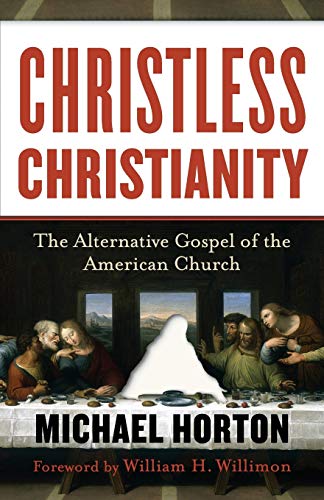
Quotes by Michael Horton
In fact, one would be hard-pressed to find anything in this message that would be offensive to a Unitarian, Buddhist, or cultural Christians who are used to a diet of gospel-as-American-Dream. Disney’s Jiminy Cricket expresses this sentiment: “If you wish upon a star, all your dreams will come true.”
God’s Word does not merely impart information; it actually creates life. It’s not only descriptive; it’s effective too, God speaking is God acting.
Never before, not even in the medieval church, have Christians been so obsessed with themselves. Never before have people entertained such grandiose notions about humans and such puny views of God.
The goal of common grace is not to perfect nature, but to restrain sin and animate civic virtues and arts, so that culture may fulfill its own important but limited, temporal, and secular ends, while God simultaneously pursues the redemptive aims of His everlasting city.
Michael Horton A Tale of Two Kingdoms, September 2008, Tabletalk, p. 12. Used by Permission.
Either our religion will transform us or we will transform our religion to suit our sympathies.
Once we truly grasp the message of the New Testament, it is impossible to read the Old Testament again without seeing Christ on every page, in every story, foreshadowed or anticipated in every event and narrative.
It is to trivialize greatly the work of Christ to suggest that God the Father sent His only-begotten Son into the world to bear the world’s blasphemy, insults, and violence, and, most of all, to bear the Father’s wrath – all for increased cash flow and fewer bouts with asthma. It is to make a joke out of the great displeasure, anger, and wrath God has toward sin and sinful persons. God’s real problem, say the faith teachers, is not that we are wicked, selfish, God-hating rebels who deserve eternal punishment, but that we aren’t enjoying ourselves!
It is appropriate that a prosperity gospel be born in the hedonistic, self-centered, get-rich-quick milieu of modern American society. We are, by nature, pagan. Either our religion will transform us or we will transform our religion to suit our sympathies.
If one’s greatest problem is loneliness, the good news is that Jesus is a reliable friend. If the big problem is anxiety, Jesus will calm us down. Jesus is the glue that holds our marriages and families together, gives us purpose for us to strive toward, wisdom for daily life. And there are half-truths in all of these pleas, but they never really bring hearers face to face with their real problem: that they stand naked and ashamed before a holy God and can only be acceptably clothed in His presence by being clothed, head to toe, in Christ’s righteousness.
So who needs Christ? At least, who needs Christ as “the Lamb of God who takes away the sin of the world” (Jn 1:29)? The sting of the law may be taken out of the message, but that only means that the gospel has become a less demanding, more encouraging law whose exhortations are only meant to make us happy, not to measure us against God’s holiness.
[Their] message is also a good example of the inability of Boomers to mourn in the face of God’s judgment or dance under the liberating news of God’s saving mercy. In other words, all gravity is lost – both the gravity of our problem and of God’s amazing grace. According to this message, we are not helpless sinners – the ungodly – who need a one-sided divine rescue. (Americans, but especially we Boomers, don’t take bad news well.) Rather, we are good people who just need a little instruction and motivation.
[The prosperity gospel is] basically what the sixteenth century German monk turned church reformer Martin Luther called the “theology of glory”: How can I climb the ladder and attain the glory here and now that God has actually promised for us after a life of suffering? The contrast is the “theology of the cross”: the story of God’s merciful descent to us, at great personal cost, a message that the Apostle Paul acknowledged was offensive and “foolish to Greeks.”
A church is not a group of friends you’ve picked, it’s a group of brothers and sisters God has picked for you.
[We must not let] hell, rather than God, becomes the object of fear (Mt. 10:28)… Whatever the exact nature of this everlasting judgment, it is horrible ultimately for one reason only: God is present… Hell is not ultimately about fire, but about God. Whatever the exact nature of the physical punishments, the real terror awaiting the unrepentant is God Himself and His inescapable presence forever with His face turned against them.
Hell Is Not Separation from God, CCC Discover, Used by Permission, https://cccdiscover.com/hell-is-not-separation-from-god.
A measure of our own ongoing sinfulness is that we just don’t understand the beauty of God’s holiness, righteousness, and justice and the equal ultimacy of these attributes with his love. But one day we will not have a problem with eternal punishment. It will make perfect sense. We are not entitled, much less required, in our present condition to defend the doctrine of eternal punishment in any way that either exceeds Scripture or reflects a perverse delight in damnation. Since God does not delight in the death of the wicked, neither can we.
Hell Is Not Separation from God, CCC Discover, Used by Permission, https://cccdiscover.com/hell-is-not-separation-from-god.
If we read the Bible carefully we conclude that everyone, as a creature made in God’s image, has a personal relationship with God. Therefore, God is, after the fall, either in the relationship of a judge or a father to His creatures.
Hell Is Not Separation from God, CCC Discover, Used by Permission, https://cccdiscover.com/hell-is-not-separation-from-god.
The visible church is where you will find Christ’s kingdom on earth, and to disregard the kingdom is to disregard its King.
Forward by Michael Horton taken from Church Membership by Jonathan Leeman, copyright (2012), Crossway Books, a division of Good News Publishers, Wheaton Illinois 60187, www.crosswaybooks.org, p. 15.


